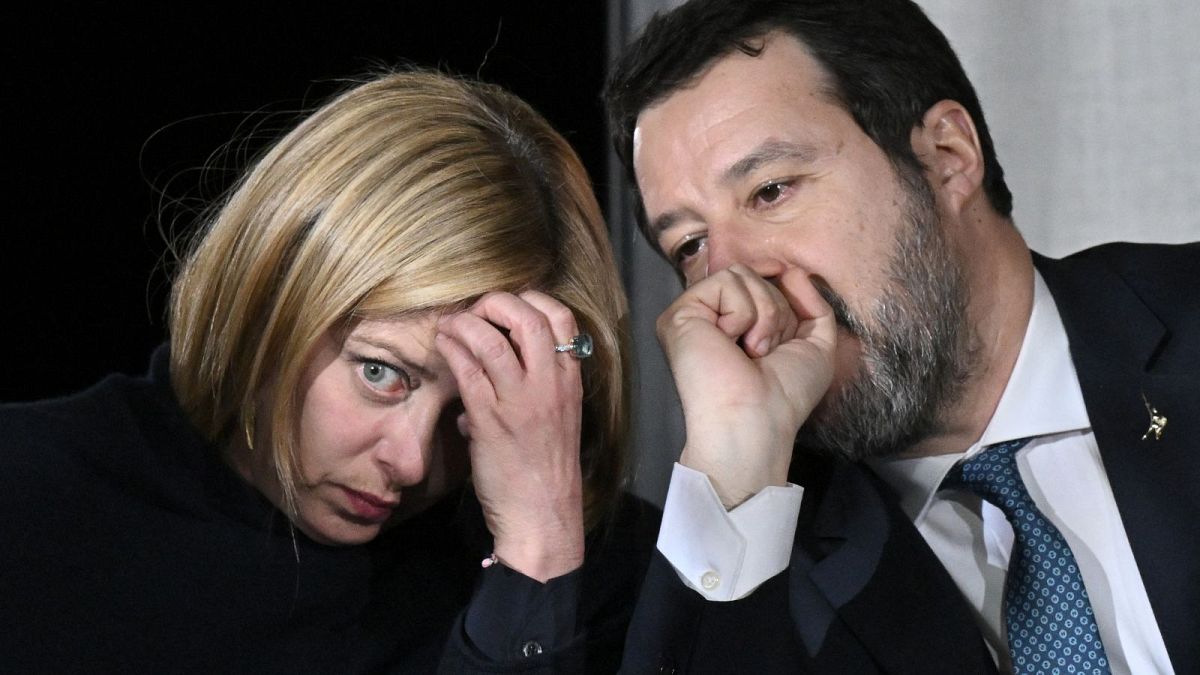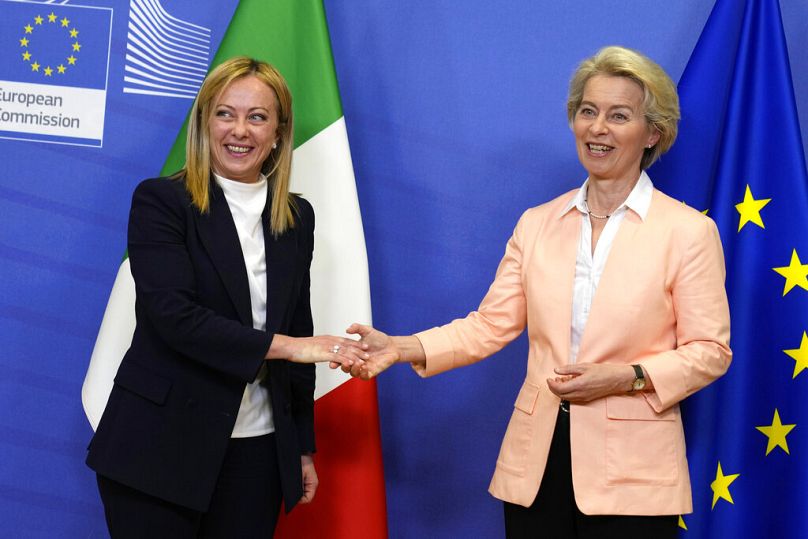Instead of addressing complex, long-term challenges, Meloni's government has focused its legislative efforts on a series of "symbolic" sovereignty policies.
First came a controversial crackdown on rave parties. Then, a ban on the much-debated ChatGPT chatbot, the first of its kind across the world, followed by a ban on synthetic meat. Finally, a plan to issue hefty fines for using English words in official communications -- which many people initially thought was an April Fool's joke, but turned out to be real.
After Prime Minister Giorgia Meloni's right-wing government pushed forward a series of unlikely policies in the past few months, some people have been left scratching their heads wondering: what's really going on with Italy's leadership, and these oddball policies?
Francesco Strazzari, professor in International Relations at the Pisa-based Scuola Universitaria Superiore Sant'Anna, told Euronews that the recent wave of improbable legislation passed by Meloni's government is "a weapon of mass distraction."
As Italy faces serious issues which are currently shared with many European countries, like a lingering energy and cost-of-living crisis and a growing flow of migration to its southern shores, these somewhat petty legislative initiatives have the ability to spark endless debates on social media and among the Italian public – even if only to ridicule the government.
"Every time Meloni's government is in a difficult moment, it comes up with controversial policies which have the power of deflecting attention from its poor performance and its disastrous policies," Strazzari said.
What bigger issues hide behind these "shallow policies"?
When the Italian government passed a law banning illegal rave parties last November, it did so despite the fact there was no urgency for such a law, Strazzari told Euronews, as the issue didn't pose an immediate challenge to the country and could have been solved in due time.
"But there was a strong attempt to inflate the ban, in terms of public attention, in the face of looming danger -- a new law surrounding the search and rescue missions in the Mediterranean, around which there were already strong arguments," Strazzari said.
Shortly after the rave ban, Meloni's government passed a law forbidding NGOs' search and rescue ships from embarking on more than one operation at a time and forcing them to disembark in the harbours indicated by authorities, which Strazzari said they're usually "very remote."
This decree-law, which significantly limits the operation capacity of NGOs' search and rescue ships, has already caused tense situations in the Mediterranean between NGOs and Italian authorities.
The most recent policies surrounding ChatGPT, synthetic meat, and the use of English and foreign words in official communications came at a time when a very serious debate around the country's prison system and sentences is unfolding in Italy, rekindled by inmate Alfredo Cospito's hunger strike.
According to Strazzari, the harsh punishment imposed on Cospito, an Italian anarchist serving a strict prison regime usually reserved for mafia bosses, is "very controversial in terms of international norms, because in rule-of-law countries the severity of a sentence has to be measured in terms of time length, not imprisonment conditions."
But instead of addressing complex, long-term challenges like the ones posed by Cospito's hunger strike or migrant arrivals on the Italian shores, Meloni's government has focused its legislative efforts on a series of policies "in the name of cultural nationalism, [...] an idea of the nation as something that is not negotiable, that exists in purity in some idyllic past, against contamination from migrants, anarchists, and the food industry," said Strazzari.
The debate around these nationalist policies once again works as a distraction from much more consequential -- and controversial -- new laws that Meloni's government is trying to pass -- like a bill criminalising surrogacy done abroad.
Last month, the Italian parliament started discussing a controversial law which would extend Italy's long-standing surrogacy ban on couples travelling abroad for the procedure to countries like the US, Canada, and India. Under the proposed law, sponsored by Brothers of Italy and the League, those found seeking a surrogate mother for their babies abroad could be imprisoned for a time between three months and two years or face fines between 600,000 and 1 million euros.
For same-sex couples trying to have a baby through surrogacy, the law would be extremely damaging.
A sovereign push that's likely to put Italy against the European Union
The recent controversial policies introduced by Meloni's government are not only a game of smoke and mirrors: these legislative efforts are also "well in line with the party's ideology," Marianna Griffini, lecturer in the Department of European and International Studies at King's College London, told Euronews.
"Meloni's party is one pushing for Italy's sovereignty, and these policies are sending the message: 'Do not interfere with our domestic affairs,' even if it's only about cultural affairs, cultural sovereignty," she said. The recipient of this message? The EU.
Italy's ban on synthetic meat, Griffini said, can be seen as a way for Italy to reclaim sovereignty over the EU for matters related to its food, after the EU had already given the green light to lab-grown meat in the bloc.
Griffini isn't the only one to see it this way. For Strazzari, Meloni's government's "ridiculous" policies "mobilising shallow calls to national identity and national rhetoric" all lead in the direction of a sovereign push whose ultimate goal is to wriggle out of the European Union's control -- following the footsteps of Poland and Hungary.
"There's a clear way in which Meloni is trying to benefit from the shifting of the very centre of European politics towards the East with the war in Ukraine [...], a shift which has given more gravity to Poland and Hungary," Strazzari said. "[These countries] are second to no one when it comes to social conservatism and nationalism -- especially Poland, with its stress on the traditional family and Catholicism."
Because of its anti-LGBT policies, Poland has entered in contrast with the EU over the question of the primacy of national law over EU law -- an issue that has been raised by Meloni before she even came into power last year.
In 2018, when Meloni was still in the opposition, the far-right politician was the first signatory of a legislative proposal which asked for modifying two articles of the Italian constitution which state that Italy recognises the primacy of European law over national law. "That proposal is still there," Strazzari said. "It hasn't been discussed but it hasn't been withdrawn either -- it's kind of frozen there."
According to Strazzari, there's now "an attempt to find congruence" in Italy with Poland and Hungary in terms of introducing nationalist policies which have the potential to go against the EU's recognised fundamental rights. The proposed surrogacy ban is an example of this initiative.
The Minister of Foreign Affairs, Antonio Tajani, who served as president of the European Parliament from 2017 and 2019, recently commented on the European Parliament's criticism of Meloni's government for the introduction of a law that could ban surrogacy for Italians travelling abroad to have the procedure saying that "Italy's regulations are made in Italy, not in Brussels."
"It's quite a stunning declaration on the part of someone who was the head of the European Parliament and knows pretty well what are the prerogatives of the EU Parliament, which is elected by Italians, among others. We delegate parts of our sovereignty to that Parliament," Strazzari said. "But this statement was rather blunt in rejecting criticism coming from the Parliament. [...] This raises alert from a European point of view."
But Griffini sees Meloni's government's sovereign efforts simply as "symbolic battles" rather than a real attempt to rebel against the EU. "There is too much at stake," Griffini said. "There are the famous national recovery and resilience plan's funds at stake, so I don't think that the relationship with the EU will come to the point of outward hostility."
Italy's recovery plan, which followed the unprecedented crisis of the pandemic, consists of 132 investments and 58 reforms and is supported by €68.9 billion in grants and €122.6 billion in loans to the country.
"Italy still needs this money," Griffini said.
"During her campaign, Meloni turned down her Euro-scepticism, and a glaring example of this is that her first state visit was to the EU, when she met Ursula von der Leyen. It's unlikely that she will fully rebel against the EU. These policies seem more symbolic than anything."


